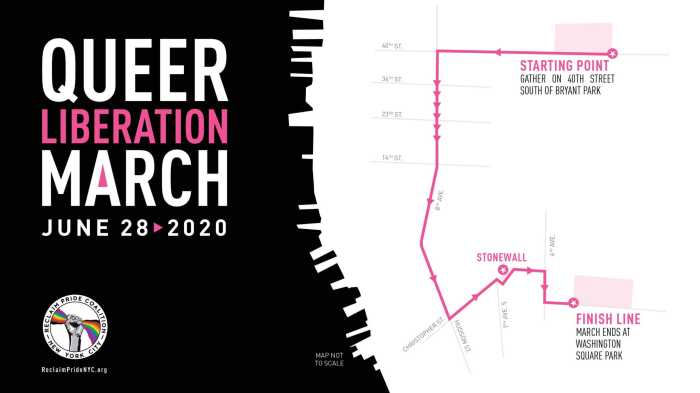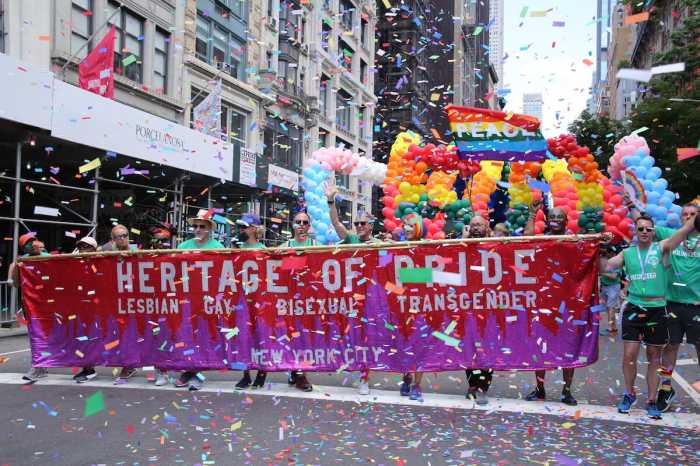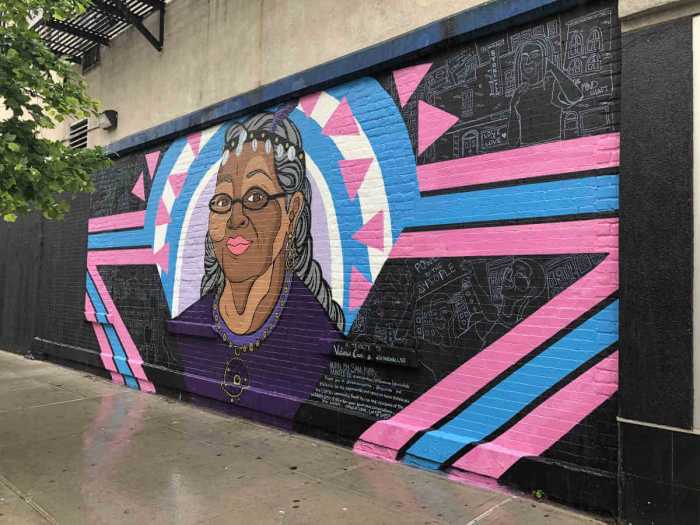A protester affiliated with Hoods4Justice arrested outside the Stonewall Inn during the June 25 Pride Parade. | DONNA ACETO
While five of the 12 activists who were arrested for blockading New York City’s Pride Parade on June 25 are facing misdemeanor counts of trespassing, obstructing governmental administration, and disorderly conduct, they were offered community service sentences in exchange for guilty pleas to disorderly conduct, which is a violation, not a crime.
At their August 23 arraignment, two activists were offered a single day of community service, two were offered two days of community service, and a fifth was offered five days of community service.
Altogether, 12 members of Hoods4- Justice were arrested yards from the Stonewall Inn after they jumped the barriers that line the parade route. They either handcuffed themselves together or held hands inside of tubes that covered their arms. Police had to cut through the tubes or threaten to do so to separate the activists.
Heritage of Pride urged by other activists to intervene to seek dismissal of charges
Hoods4Justice objected to the police presence in New York City’s Pride Parade and to the corporate sponsors that are a small number of the groups in the parade, but a more visible presence with large floats and banners.
“To the police — You cannot mass incarcerate us, brutalize us, murder us, and call it pride,” Hoods4Justice wrote in a statement that was posted on its Facebook page hours before the action. “To Wells Fargo, Citi, and remaining corporate sponsors — You cannot pillage our homes, brand us, rob us of our dignity, invest in our imprisonment, and spray us with water hoses in sub-freezing temperatures and call it sponsorship. To the politicians — You cannot sit idly by and call it allyship.”
The activists timed their move onto Christopher Street so that they were blocking the parade route just as the NYPD’s marching band, which was leading GOAL, the NYPD’s LGBTQ police group, arrived. Mounting the blockade yards from the Stonewall Inn was intentional. That bar is the site of the 1969 riots that mark the start of the modern LGBTQ rights movement.
Using court records, Gay City News identified seven of the 12 activists who were arrested on June 25 and learned the disposition of their cases. Seven were scheduled for arraignment on August 23. Gay City News does not know the status of two of those seven or the five who were not arraigned on that date.
Heritage of Pride (HOP), the group that produces New York City’s annual LGBTQ Pride events, is facing some pressure to intervene in these cases. Rise and Resist (RAR), the activist group that is protesting Republican policies and control of the White House and Congress, wrote to HOP on August 17 demanding that it seek dismissals and that it “actively create a more inclusive, representative, less oppressive atmosphere for all participants from every corner of the LGBTQ Community at the Pride March.”
A man wearing an HOP T-shirt reading “Executive Board” conferred with police during the arrests.
“Their sit-down protest was not endorsed by or connected to RAR,” the group, which was among a number of organizations given a prime lead spot in the parade to voice resistance to the Trump administration, wrote in its August 17 letter. “However, as a direct action organization, we at RAR strongly condemn Heritage of Pride for working with the police and district attorney’s office to persecute the non-violent protest of queer and trans individuals whose action was taken in the true, original spirit of the 1969 Stonewall Rebellion.”
HOP will weigh a response to RAR’s demands at its next executive board meeting, which could come on September 5. The board meetings are typically public, but like all boards, HOP’s board can meet in non-public executive session. Julian Sanjivan, HOP’s march director, attended the August 23 arraignment.
“We did authorize the arrests at the march as the permit holder for the march,” James Fallarino, HOP’s spokesperson, told Gay City News. “The specific charges that are being brought against the protesters are being decided by the district attorney’s office.”
HOP’s longstanding policy is that it allows any group into the march as long they comply with HOP’s rules and procedures.
Fallarino called the march “a free speech event” and added that HOP consistently looks at improving the march.
“That’s something that we’re constantly looking at,” he said. “That’s an ongoing conversation.”
Hoods4Justice did not respond to requests for comment. The activists are due back in court on October 4.



































